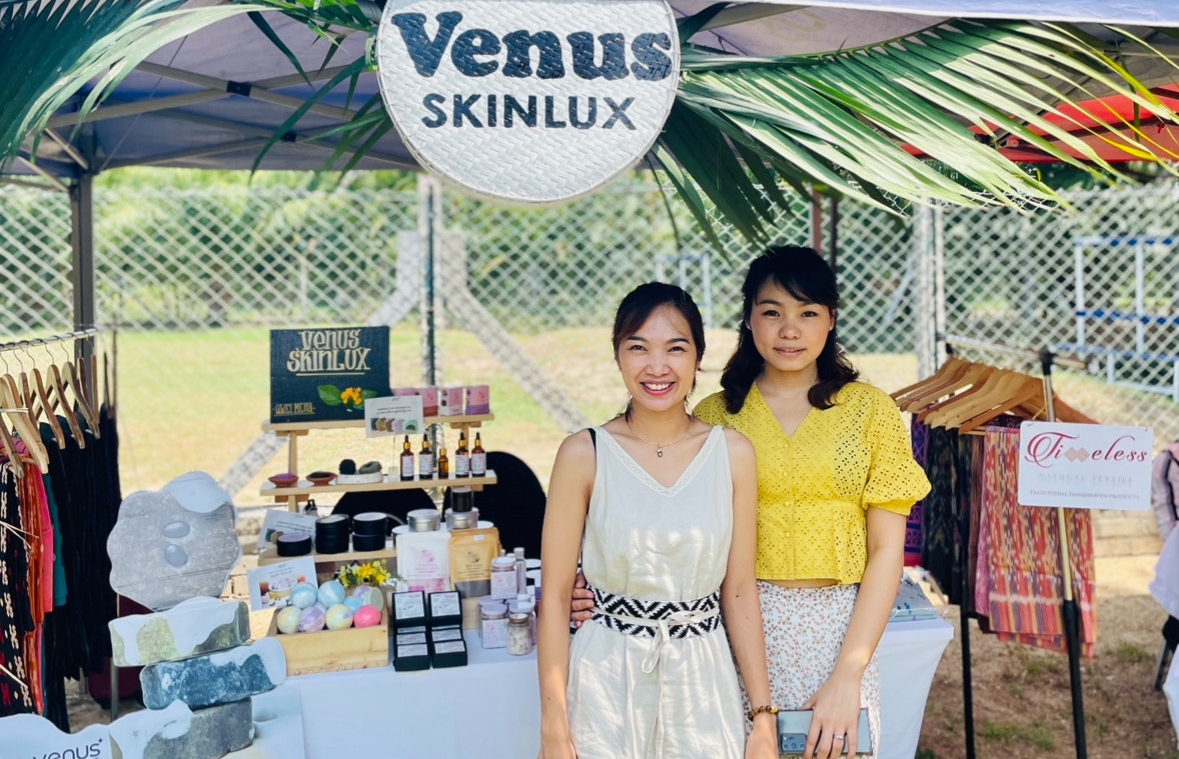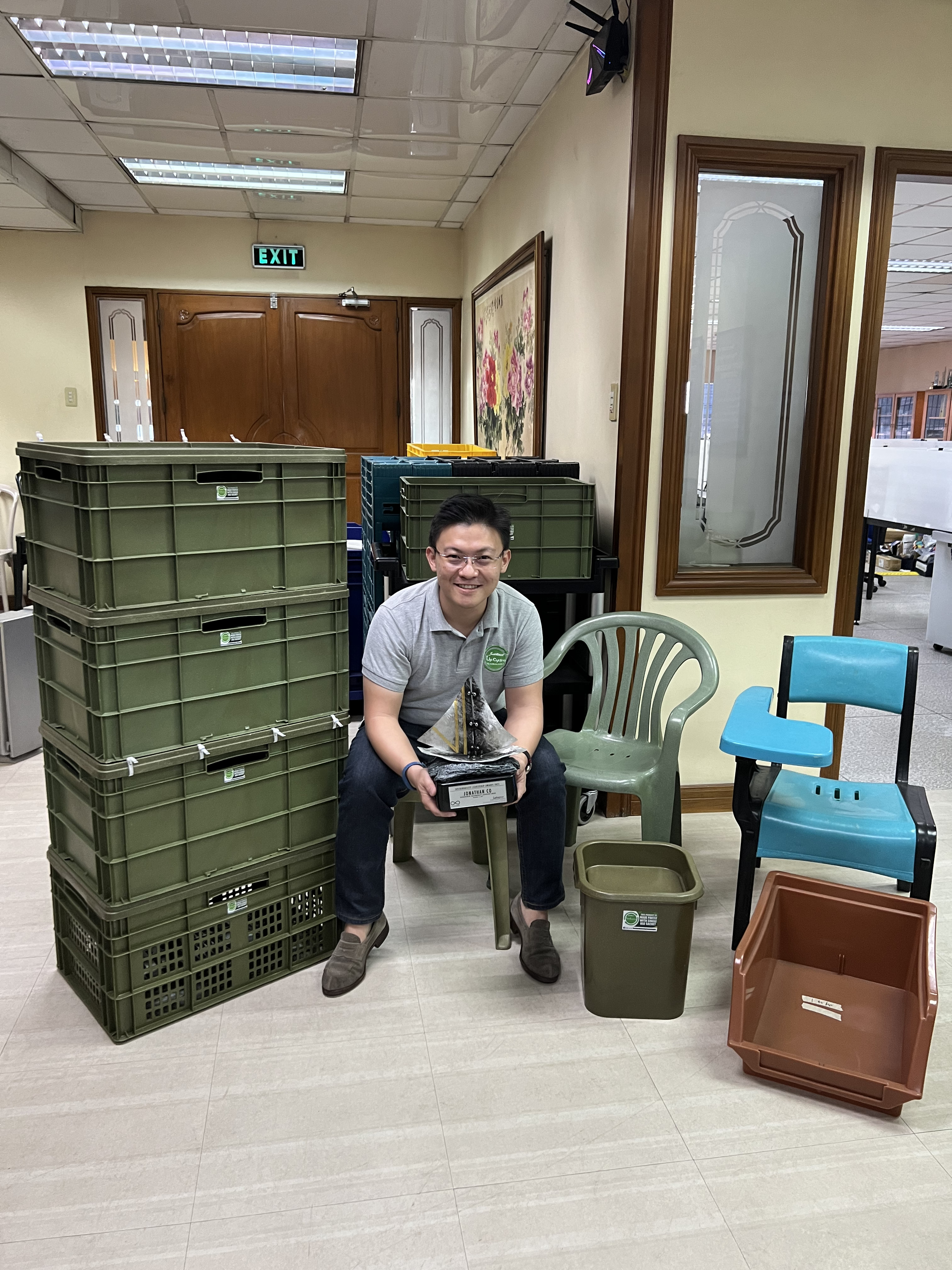

In a world increasingly driven by conscious consumerism, Dr Yee Yee Mon stands out as a figure in sustainable beauty in Myanmar. As a medical doctor, certified organic cosmetic science formulator, and circular entrepreneur, she brings a unique blend of scientific expertise and sustainability commitment to her brand, Venus Skinlux. Driven by a deep respect for nature, Dr Mon formulates skincare products using naturally derived ingredients from Myanmar, paired with eco-friendly, handcrafted packaging made by local artisans. Her passion and commitment have helped establish Venus Skinlux as one of the responsible brands in the country’s beauty industry.
Venus Skinlux is on a mission to transform everyday self-care into a more meaningful and planet-friendly experience. Specialising in handcrafted soap bars, shampoo bars, and conditioner bars, the brand offers zero-waste, plastic-free alternatives to traditional haircare. The shampoo bars, for example, are hand-pressed and made with sulphate-free coconut surfactants, nourishing oils, butters, and herbal extracts – offering a thoughtful way to care for hair without harming the environment. In 2023 alone, Venus Skinlux helped prevent 1,000 plastic bottles from entering landfills, and by July 2024, that number had increased to 2,222 bottles.
In this edition of the Beyond the Business article series, the Regional Knowledge Centre for Marine Plastic Debris (RKC-MPD) spoke with Dr Mon to uncover the inspiring journey her efforts to set new standards for sustainable beauty in Myanmar.
Yee Mon: I founded this business with a focus on natural approaches and a deep commitment to the planet. As a medical doctor, I practised until 2022, then decided to make a career shift. I realised that while medicine treats health problems, I wanted to promote holistic well-being in a more preventive and sustainable way. I also hoped to create something that supports not only people’s health, but also the environment and the wider community.
As a small business, we believe that real change starts from the grassroots. If the private sector doesn’t take the initiative, and everyone keeps waiting for someone else to act, nothing will change. That’s why we choose to lead by example.
The hardest part is shifting consumer behaviour. People are used to convenience and low-cost materials like plastic packaging. When we introduced shampoo bars, we found that although they are more effective and environmentally friendly, many customers were hesitant to try them. Some people still associate bars with old-fashioned or low-quality products. Even one of my business advisors questioned the decision, saying that it felt like a step backward to use bars instead of modern liquid shampoos. But the truth is, shampoo bars are a modern and sustainable alternative. The misconception is common, even amongst educated professionals.
It is definitely more challenging. Compared to other brands, we need to be more mindful about every detail, including ingredients, packaging, and even post-consumer waste. Balancing all of this is not easy, but we must do it.
Profitability should align with our brand values. To achieve this, we try to educate consumers about the advantages of sustainable products, such as cost-effectiveness, better skin health, and reduced environmental impact. Then we offer alternatives, such as refillable liquid shampoo. We want to give people options, not force choices.
We already have the technology and capability to produce locally. However, local brands often operate in niche markets. Competing with multinational companies in terms of scale and pricing is nearly impossible at this stage. So, while we may not be their direct competitors, we offer something different – locally made and sustainable products.
Yes, that does happen. But more competition also leads to more market growth and greater public awareness. When more companies adopt this model, more customers become familiar with it, and that benefits everyone. You cannot build a movement alone. Together, we have the power to transform the market.
Especially amongst women-led businesses and those in the food industry, there is increasing awareness and consciousness around sustainability. Larger companies tend to be slower to adopt these changes. Since 2024, education and advocacy efforts have helped raise more awareness. Some businesses have started trying out ideas like returnable packaging and offering discounts for product returns. However, adoption remains limited because only a small number of consumers are participating. To improve this, we need systems that are more convenient and have accessible return points for everyone.
Sometimes, yes. The challenges can be overwhelming, but the continued support from our loyal customers and environmentally conscious organisations keeps me going.
In the next five to 10 years, I hope Venus Skinlux will grow into one of Myanmar’s leading local brands. My long-term vision is to expand internationally. I want our products to be recognised both locally and globally for their quality, sustainability, and positive social impact.
I would start by sharing the benefits we have experienced from switching to more sustainable packaging. Yes, importing materials and handling logistics can be challenging, but if we work together and experiment, we can find better solutions. It is not just about protecting the environment but also unlocking additional business opportunities.
When we introduced our refill system, it created a whole new market segment for us. As more businesses begin to see this potential, momentum will build. One company makes a change, then another follows, and over time, we will have a stronger network.
Their involvement is crucial because change cannot come from just one company. We need to raise awareness, highlight the practical benefits, and share effective solutions. The more businesses see sustainability as both a responsibility and an opportunity, the more successful this movement will be.
Dr Mon’s journey with Venus Skinlux shows that sustainable beauty is about caring for both people and the planet. Her story is a reminder that meaningful change often begins with individuals and small businesses willing to lead by example. As more local brands embrace innovation and environmental responsibility, they are helping reshape the industry and inspire positive change.
In a world increasingly driven by conscious consumerism, Dr Yee Yee Mon stands out as a figure in sustainable beauty in Myanmar. As a medical doctor, certified organic cosmetic science formulator, and circular entrepreneur, she brings a unique blend of scientific expertise and sustainability commitment to her brand, Venus Skinlux. Driven by a deep respect for nature, Dr Mon formulates skincare products using naturally derived ingredients from Myanmar, paired with eco-friendly, handcrafted packaging made by local artisans. Her passion and commitment have helped establish Venus Skinlux as one of the responsible brands in the country’s beauty industry.
Venus Skinlux is on a mission to transform everyday self-care into a more meaningful and planet-friendly experience. Specialising in handcrafted soap bars, shampoo bars, and conditioner bars, the brand offers zero-waste, plastic-free alternatives to traditional haircare. The shampoo bars, for example, are hand-pressed and made with sulphate-free coconut surfactants, nourishing oils, butters, and herbal extracts – offering a thoughtful way to care for hair without harming the environment. In 2023 alone, Venus Skinlux helped prevent 1,000 plastic bottles from entering landfills, and by July 2024, that number had increased to 2,222 bottles.
In this edition of the Beyond the Business article series, the Regional Knowledge Centre for Marine Plastic Debris (RKC-MPD) spoke with Dr Mon to uncover the inspiring journey her efforts to set new standards for sustainable beauty in Myanmar.
Yee Mon: I founded this business with a focus on natural approaches and a deep commitment to the planet. As a medical doctor, I practised until 2022, then decided to make a career shift. I realised that while medicine treats health problems, I wanted to promote holistic well-being in a more preventive and sustainable way. I also hoped to create something that supports not only people’s health, but also the environment and the wider community.
As a small business, we believe that real change starts from the grassroots. If the private sector doesn’t take the initiative, and everyone keeps waiting for someone else to act, nothing will change. That’s why we choose to lead by example.
The hardest part is shifting consumer behaviour. People are used to convenience and low-cost materials like plastic packaging. When we introduced shampoo bars, we found that although they are more effective and environmentally friendly, many customers were hesitant to try them. Some people still associate bars with old-fashioned or low-quality products. Even one of my business advisors questioned the decision, saying that it felt like a step backward to use bars instead of modern liquid shampoos. But the truth is, shampoo bars are a modern and sustainable alternative. The misconception is common, even amongst educated professionals.
It is definitely more challenging. Compared to other brands, we need to be more mindful about every detail, including ingredients, packaging, and even post-consumer waste. Balancing all of this is not easy, but we must do it.
Profitability should align with our brand values. To achieve this, we try to educate consumers about the advantages of sustainable products, such as cost-effectiveness, better skin health, and reduced environmental impact. Then we offer alternatives, such as refillable liquid shampoo. We want to give people options, not force choices.
We already have the technology and capability to produce locally. However, local brands often operate in niche markets. Competing with multinational companies in terms of scale and pricing is nearly impossible at this stage. So, while we may not be their direct competitors, we offer something different – locally made and sustainable products.
Yes, that does happen. But more competition also leads to more market growth and greater public awareness. When more companies adopt this model, more customers become familiar with it, and that benefits everyone. You cannot build a movement alone. Together, we have the power to transform the market.
Especially amongst women-led businesses and those in the food industry, there is increasing awareness and consciousness around sustainability. Larger companies tend to be slower to adopt these changes. Since 2024, education and advocacy efforts have helped raise more awareness. Some businesses have started trying out ideas like returnable packaging and offering discounts for product returns. However, adoption remains limited because only a small number of consumers are participating. To improve this, we need systems that are more convenient and have accessible return points for everyone.
Sometimes, yes. The challenges can be overwhelming, but the continued support from our loyal customers and environmentally conscious organisations keeps me going.
In the next five to 10 years, I hope Venus Skinlux will grow into one of Myanmar’s leading local brands. My long-term vision is to expand internationally. I want our products to be recognised both locally and globally for their quality, sustainability, and positive social impact.
I would start by sharing the benefits we have experienced from switching to more sustainable packaging. Yes, importing materials and handling logistics can be challenging, but if we work together and experiment, we can find better solutions. It is not just about protecting the environment but also unlocking additional business opportunities.
When we introduced our refill system, it created a whole new market segment for us. As more businesses begin to see this potential, momentum will build. One company makes a change, then another follows, and over time, we will have a stronger network.
Their involvement is crucial because change cannot come from just one company. We need to raise awareness, highlight the practical benefits, and share effective solutions. The more businesses see sustainability as both a responsibility and an opportunity, the more successful this movement will be.
Dr Mon’s journey with Venus Skinlux shows that sustainable beauty is about caring for both people and the planet. Her story is a reminder that meaningful change often begins with individuals and small businesses willing to lead by example. As more local brands embrace innovation and environmental responsibility, they are helping reshape the industry and inspire positive change.

Research Associate

Director and Programme Manager at Thant Myanmar


